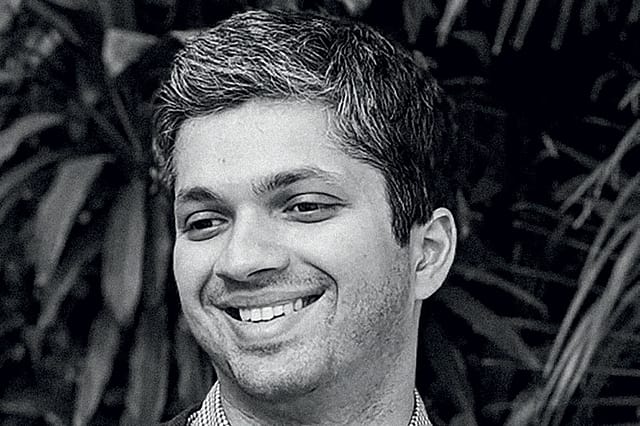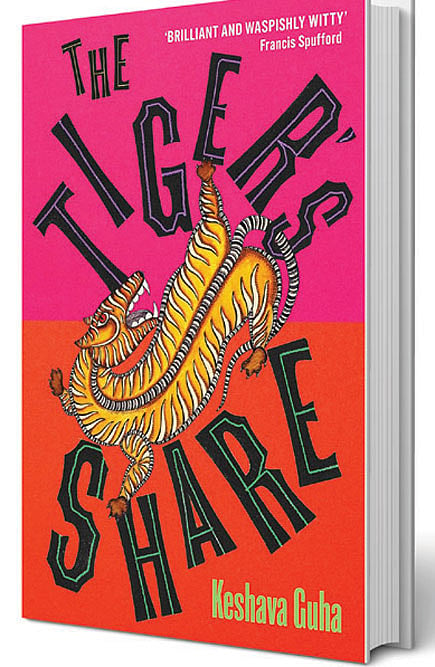Eco Friction

MANY INDIAN NOVELS in recent years have involved people “retreating” from society and heading towards the forest for philosophical reasons; VJ James’ Dattapaharam: Call of the Forest (2023), Anupama Mohan’s Where Mayflies Live Forever (2023), Sundar Sarukkai’s Following a Prayer (2023) et al. All three books engage (either ironically or in earnest) with Hinduism’s tradition of ‘vaanprastha’ or ‘retiring to the forest’, the penultimate among the religion’s four designated stages of life.
Keshava Guha’s excellent new novel The Tiger’s Share begins with an immersive retreat not to the forest but to ecology itself. Retired Delhi accountant Brahm Saxena announces to his adult children Tara and Rohit that he doesn’t have anything left to offer them—he now wishes to devote the remainder of his life to ecological concerns, news that Rohit in particular finds difficult to digest. The smart, even-tempered Tara, a lawyer, becomes embroiled in not only her own inheritance saga but that of her friend Lila and her boorish brother Kunal, an unapologetic patriarch and founder of an organisation seeking to rewrite syllabi across the country along nationalistic lines. The trajectories of both sets of siblings add up to a compelling, ‘funnysad’ portrayal of contemporary Delhi, and its infinite fissures along gender, caste and class lines.
“Both organised religion and ecological movements offer non-materialistic ways of thinking, non-material considerations and motivations” Guha says during an interview. “And it’s a different kind of divergence compared to, say, Marxism, which offers a material utopia for everybody whereas religion offers a non-material utopia—but only for believers, of course. What made the earlier generation of Indian idealists special was that you had a mixture of people. You had overtly religious idealists, and then you had people whose idealism came from secular sources (Bhagat Singh etc).”
Openomics 2026: Continuity and Conviction
06 Feb 2026 - Vol 04 | Issue 57
The performance state at its peak
At the familial level, extreme idealism leads to martyr-like fathers and adult children who range from confused to disenchanted. In The Tiger’s Share, too, there is a recurring thread of the ‘human cost’ extracted by idealism, especially in the way Rohit devolves into the ‘manosphere’ of YouTube. He becomes a popular YouTuber whose message is in direct opposition to his father’s — that climate change is nonsense, that animal rights and conservatism are holding the country back and that young men need not survival, but “thrival” (his own coinage), a maximalist, high-octane worldview where you are either the aggressor or the victim. Basically, with every video Rohit undertakes a ritual killing of his father and his ideas, sliding further and further into algorithm-aided mania, a millennial Oedipus seeking solace in absolute convictions.
The beating heart of the novel, however, is Tara. Thanks to Guha’s solid grip on her character, we quickly see an intelligent, pragmatic and likeable protagonist who treats the world justly, but is keenly attuned to its injustices all the same. I particularly enjoyed the small and big ways in which Tara is linked to the great heroines of Victorian literature. At one point she ponders, “What if, in five years or ten, I woke up one morning and had the same horrifying epiphany about my spinsterhood that Isabel Archer had had about her marriage, and knew that I was every bit as condemned as she was?” Archer, of course, is the protagonist of Henry James’ novel The Portrait of a Lady. At another, we are told that the WiFi password at her place is “beckysharp”, referring to Rebecca Sharp from William Makepeace Thackeray’s Vanity Fair. However, Guha takes care not to restrict Tara to either the moral certitude of Archer or the amoral ruthlessness of Sharp, giving her and the novel plenty of room to find their voice, which they do in style.

